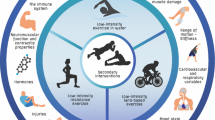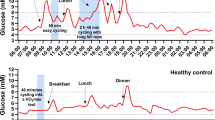Abstract
Energy drinks have gained popularity among athletes. The purpose of this study was to determine the acute effects of Phantom and Dragon energy drinks on endurance performance. For this reason 12 female athlete students of Tehran University (age 22±0.63 years, height 162.1±5.8 cm, weight 56.91±6.79 kg) volunteered and performed three sessions on a Bruce treadmill test four days apart from each other. In each session, in a randomised, placebo-controlled, counterbalanced and double-blind design 6 ml/kg body weight of Phantom, Dragon or placebo was consumed 40 min before an exercise test. Using a 3×3 repeated measures analysis of variance and Least Significant Difference (LSD), a significant increase in VO2max time to exhaustion and a decrease in post-test rating of perceived exertion was found for Phantom and Dragon vs. placebo (p<0.05). No significant difference was observed in pre-test hear rate for three drinks (p>0.05). Post-test hear rate increased significantly for Dragon vs. Phantom and placebo (p<0.05). In conclusion, two commercially available energy drinks had ergogenic effects on endurance performance.
Similar content being viewed by others
References
Carvajal-Sancho A (2005) The acute effect of an energy drink on physical and cognitive performance of male athletes. Kinesiologia Slovenica 11:5–16
Maughan R, Murray R (2001) Sports drinks: basic science and practical uses. CRC Press, Boca Raton, FL
Alford C, Cox H, Wescott R (2001) The effects of Red Bull energy drink on human performance and mood. Amino Acids 21:139–150
Geiss K-R, Jester I, Falke W et al (1994) The effect of a taurine containing drink on performance in 10 endurance-athletes. Amino Acids 7:45–56
Baum M, Weiss, M (2001) The influence of a taurine containing drink on cardiac parameters before and after exercise measured by echocardiography. Amino Acids 20:75–82
Umana-Alvarado M, Moncada-Jiménez J (2004) The effect of an energy drink on aerobic performance in male athletes. Med Sci Sports Exerc 36[Suppl 174]
Byars A, Greenwood M, Greenwood L et al (2006) The effectiveness of a pre-exercise performance drink (PRX) on indices of maximal cardiorespiratory fitness. J Int Soc Sports Nutr 3:56–59
Niles ES, Lachowetz T, Garfi J et al (2001) Carbohydrate-protein drink improves time to exhaustion after recovery from endurance exercise. J Exerc Physiol 4:45–52
Barthel T, Mechau D, Schnittker R et al (2001) Readiness states of physical activation and after ingestion of taurine and/or caffeine containing. Amino Acids 20:63–73
Ostojic SM, Mazic S (2002) Effects of a carbohydrate-electrolyte drink on specific soccer tests and performance. J Sports Sci Med 1:47–53
Khanna GL, Manna I (2005) Supplementary effect of carbohydrate-electrolyte drink on sports performance, lactate removal & cardiovascular response of athletes. Indian J Med Res 121:665–669
Danielson A, Morris L, Neiderhauser L et al (2006) The physiological effects of water vs. Gatorade during prolonged exercise. J Undergrad Kin Res 1:15–22
Lombardo JA (2004) Supplements and athletes. Southern Med J 97:877–879
Mueller EL, Weise MM, Rado LC et al (2007) Effects of Red Bull on Wingate testing of college aged students. J Undergrad Kinesiol Res 2:12–18
Woojae K (2003) Debunking the effects of taurine in Red Bull energy drink. Nutrition Bytes 9:1–9
Zhang M, Izumi I, Kagamimori S et al (2003) Role of taurine supplementation to prevent exercise-induced oxidative stress in healthy young men. Amino Acids 26:203–207
McArdle WD, Katch FI, Katch VL (1994) Essentials of exercise physiology. Lea and Febiger, Philadelphia
Scott P, Howley E (2004) Nutrition, body composition, and performance. In: Powers S, Howley E (eds) Exercise physiology: theory and application to fitness and performance, 5th Edn. McGraw-Hill, Boston
Maurer J (2005) Sports beverages. Copyright by Desert Southwest Fitness, Inc
Maughan RJ (1999) Nutritional ergogenic aids and exercise performance. Nutr Res Rev 12:255–280
Ryu S, Choi SK, Joung SS et al (2001) Caffeine as a lipolytic food component increases endurance performance in rats and athletes. J Nutr Sci Vitaminol 47:139–146
Yatabe Y, Miyakawa H, Miyazaki T et al (2003) Effects of taurine administration in rat skeletal muscles on exercise. J Orthop Sci 8:415–419
Graham T, Spriet L (1995) Metabolic, catecholamine, and exercise performance responses to various doses of caffeine. J Appl Physiol 78:867–874
Bichler A, Swenson A, Harris M (2006) A combination of caffeine and taurine has no effect on short term memory but induces changes in heart rate and mean arterial blood pressure. Amino Acids 31:471–476
Rutherford J, Stellingwerff T, Spriet LL (2006) The effect of acute taurine ingestion on endurance performance in well trained cyclists. Med Sci Sport Exerc 38:S127
Utter AC, Kang J, Nieman DC et al (1999) Effect of carbohydrate ingestion and hormonal responses on ratings of perceived exertion during prolonged cycling and running. Eur J Appl Physiol Occup Physiol 80:92–99
Backhouse SH, Bishof NC, Biddle SJH et al (2005) Effect of carbohydrate and prolonged exercise on affect and perceived exertion. Med Sci Sport Exerc 37:1768–1773
Utter AC, Kang J, Nieman DC et al (2002) Effect of carbohydrate ingestion on ratings of perceived exertion during a marathon. Med Sci Sport Exerc 34:1779–1784
Doherty M, Smith PM (2005) Effects of caffeine ingestion on rating of perceived exertion during and after exercise: a meta-analysis. Scan J Med Sci Sports 15:69–78
Author information
Authors and Affiliations
Corresponding author
Additional information
An erratum to this article is available at http://dx.doi.org/10.1007/s11332-010-0095-5.
Rights and permissions
About this article
Cite this article
Kazemi, F., Gaeini, A.A., Kordi, M.R. et al. The acute effects of two energy drinks on endurance performance in female athlete students. Sport Sci Health 5, 55–60 (2009). https://doi.org/10.1007/s11332-009-0077-7
Received:
Accepted:
Published:
Issue Date:
DOI: https://doi.org/10.1007/s11332-009-0077-7




